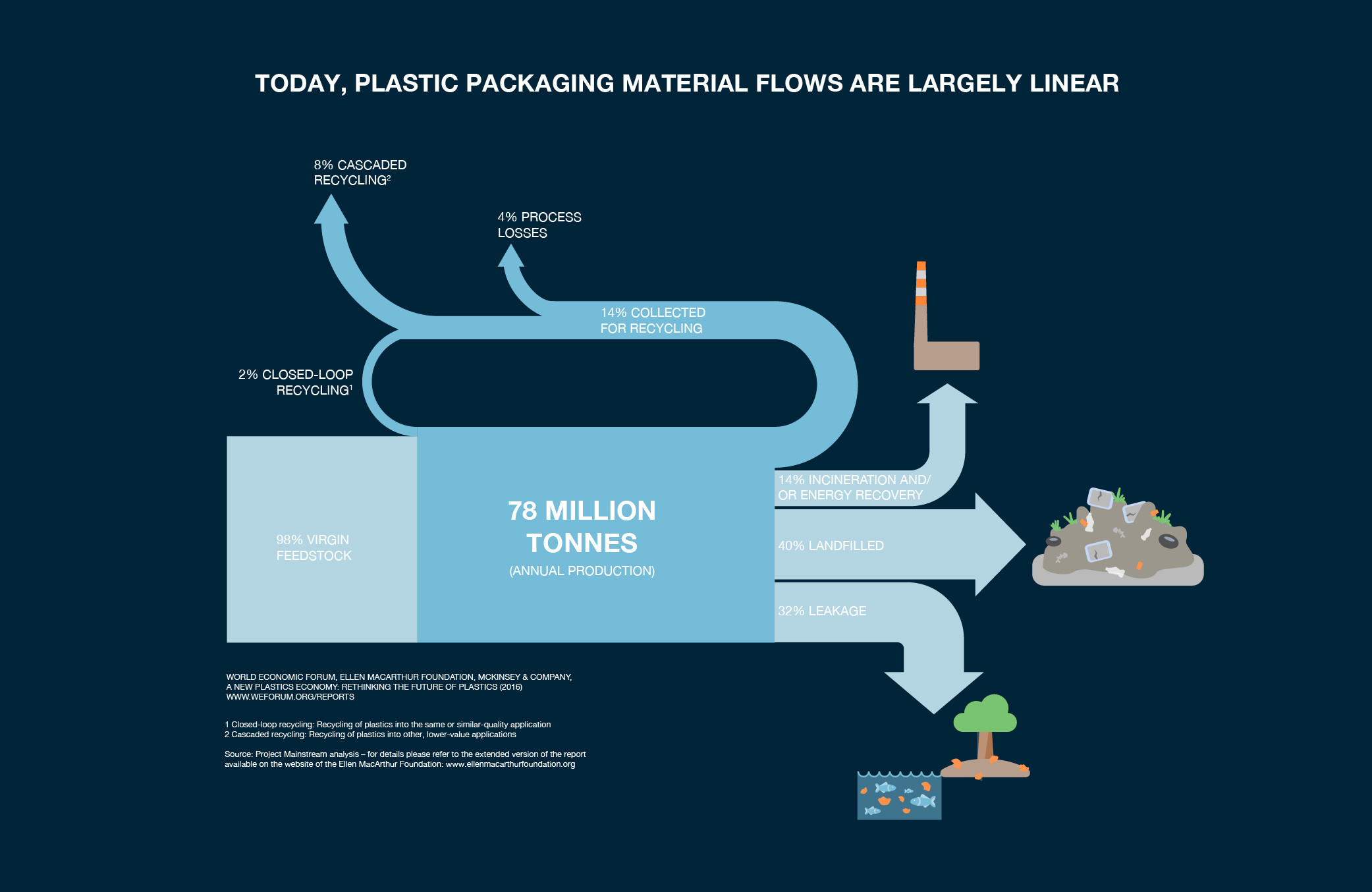How can we create a world where plastic never becomes waste?

While delivering many benefits, the current plastics economy has drawbacks that are becoming more apparent by the day. Image: REUTERS/Carlos Jasso

Get involved with our crowdsourced digital platform to deliver impact at scale
Stay up to date:
Davos Agenda
Today nearly everyone, everywhere, every day, comes into contact with plastics. Plastics have become the ubiquitous workhorse material of the modern economy – combining unrivalled functional properties with low cost. And yet, while delivering many benefits, the current plastics economy has drawbacks that are becoming more apparent by the day.
Significant economic value is lost after each use, along with wide ranging negative impacts to natural systems. How can we turn the challenges of our current plastics economy into a global opportunity for innovation and value capture, resulting in stronger economies and better environmental outcomes?
As part of Project MainStream, the World Economic Forum and Ellen MacArthur Foundation, with McKinsey & Company as a knowledge partner, have come together under the guidance of a Steering Board with nine global CEOs, to answer this question. Our latest report The New Plastics Economy: Rethinking the future of plastics lays out a blueprint for an economy where plastic never becomes waste.
What’s the state of plastics today?
Our current plastics economy can be seen as the archetypal “linear” (take-make-dispose) system:

· Significant value is lost: Most plastic packaging is used only once; 95% of the value of plastic packaging material, worth $80-120 billion annually, is lost to the economy.
· Substantial negative economic costs: The cost of negative externalities from plastic packaging (e.g. on oceans and urban infrastructure), combined with the cost associated with greenhouse gas emissions from its production is conservatively estimated at $40 billion annually – exceeding the plastic packaging industry’s profit pool.
· Under business-as-usual conditions, these negative costs are expected to increase significantly over the coming decades. Given the projected growth in consumption, by 2050 oceans are expected to contain more plastics than fish (by weight), and the entire plastics industry will consume 20% of total oil production and 15% of the annual carbon budget.

What does a New Plastics Economy look like?
At its core, it’s a new way of thinking, underpinned by the principles of the circular economy. The New Plastics Economy is a vision of a global economy where plastics never become waste. It has three main ambitions:
1. Create an effective “after-use” plastics economy – improving the economics and uptake of recycling, scaling up the adoption of reusable packaging, and adopting compostable packaging for targeted applications, helping to capture lost value.
2. Drastically reduce the “leakage” of plastics (e.g. plastics ending up in oceans) – by improving after-use infrastructure in targeted countries, increasing the economic attractiveness of keeping materials in the system, and reducing the negative impact of plastic packaging when it does escape the system
3. Decouple plastics from fossil feedstocks – primarily through the development of renewably sourced plastics i.e., either bio-based plastics or plastics made from captured greenhouse gas

How do we get there?
Our report outlines a fundamental rethink for plastics; it offers a new, explicitly systemic and collaborative approach with the potential to transform global plastic packaging material flows and thereby usher in the New Plastics Economy. The reports major recommendations include:
1. Collaboration: Establishing a Global Plastics Protocol and coordinating large-scale pilots and demonstration projects, engaging all stakeholders across the value chain including policy-makers and businesses.
2. Innovation: Mobilizing large-scale, targeted “moon shot” innovations and continuing to develop and encourage scientific research in the area, such as the search for ‘super-polymers’ that combine functionality with superior recyclability, as well as bio-benign materials.
3. Communication: Coordinating and driving communication on the nature of today’s system, the vision of the New Plastics Economy, best practices, and insights.
While current innovations and efforts to improve the plastics economy show potential, to date these have proved to be too fragmented and uncoordinated to have impact at scale. These efforts need to be complemented and guided by a concerted, global collaboration initiative that matches the scale of the challenge and the opportunity. The Ellen MacArthur Foundation will establish such an initiative to act as a global dialogue mechanism and drive the shift towards the New Plastics Economy.
Those involved in the plastic packaging chain have proven time and again their capacity to innovate. Now, harnessing this capability to improve the circularity of plastic packaging – while continuing to expand its functionality and reduce its cost – could help us move towards a system that works: a New Plastics Economy.
The full report, The New Plastics Economy: Rethinking the future of plastics, can be found here. This report has been launched at the World Economic Forum’s Annual Meeting in Davos.
Authors: Dame Ellen MacArthur, Founder, Ellen MacArthur Foundation, UK; Dominic Waughray, Head of Public-Private Partnership, Member of the Executive Committee, World Economic Forum
Don't miss any update on this topic
Create a free account and access your personalized content collection with our latest publications and analyses.
License and Republishing
World Economic Forum articles may be republished in accordance with the Creative Commons Attribution-NonCommercial-NoDerivatives 4.0 International Public License, and in accordance with our Terms of Use.
The views expressed in this article are those of the author alone and not the World Economic Forum.
Related topics:
The Agenda Weekly
A weekly update of the most important issues driving the global agenda
You can unsubscribe at any time using the link in our emails. For more details, review our privacy policy.
More on Davos AgendaSee all
Kate Whiting
April 17, 2024
Andrea Willige
March 27, 2024
Shyam Bishen
March 20, 2024
Simon Torkington
March 15, 2024
Miranda Barker
March 7, 2024






